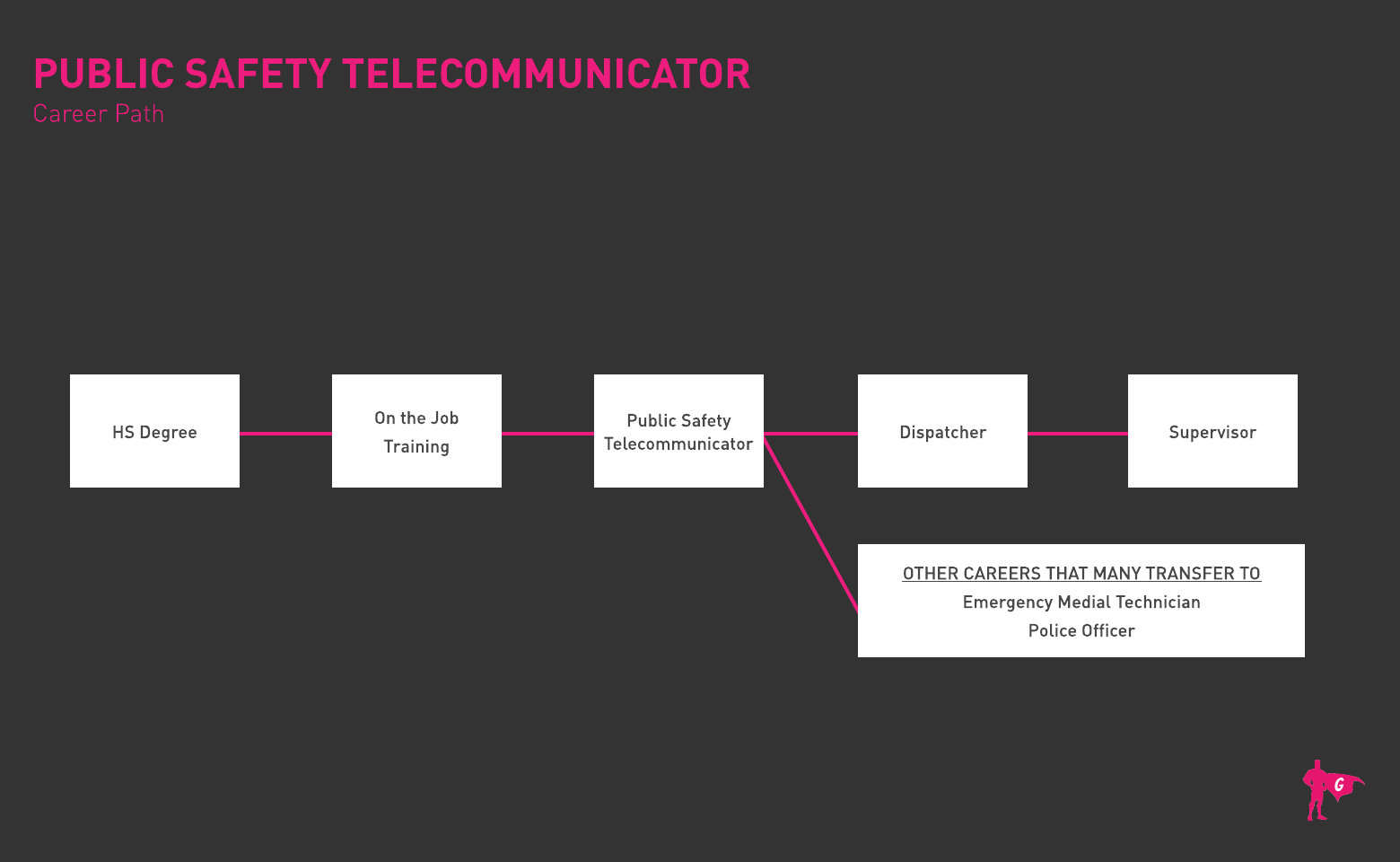聚光灯
911 调度员、通信官、通信操作员、通信专家、调度员、应急通信操作员 (ECO)、警务调度员、公共安全调度员、电信通讯员、应急响应调度员
世界可能是一个危险的地方,但幸运的是,我们拥有致力于促进公共安全和快速应对突发事件的机构。但是,这些资源是如何在正确的时间被送到正确的地点的呢?通过公共安全电话调度员的工作!这些专业的呼叫中心调度员是有需要的市民与应急响应单位之间的重要纽带。
他们利用高科技计算机系统接听电话、收集信息、与合适的警察、医疗或消防人员建立联系,然后冷静地向有需要的人派遣适当的资源。电话接线员可能会为来电者提供有限的直接帮助,如安抚或口头帮助实施急救。救灾人员到达现场后,他们会继续关注可能出现的新细节,并向救灾单位提供额外信息。
- 为需要帮助的人提供应急服务
- 可能有助于挽救生命
- 接听日常非紧急援助电话
- 防止犯罪活动愈演愈烈
工作日程
公共安全电信通讯员从事全职工作,有时需要 12 小时轮班,包括夜间、周末或节假日。
典型职责
- 接听 911 电话和发送紧急短信
- 响应警报系统或警报公司代表的来电
- 将社交媒体纳入应急响应系统
- 收集来电者的信息,如姓名、地点和有关紧急情况或情况的详细信息
- 确定是否需要警察、医疗队或消防队等应急响应单位
- 在出现多种情况时,评估事件的优先级
- 根据需要,通过移动数据终端、双向无线电或其他通信方式与救援机构联系。分享和总结事件的相关细节
- 调度和协调救援人员和车辆。监控他们在途中和到达现场后的状态
- 在来电者等待期间为其提供支持和口头指导(如如何进行急救)。
- 与来电者分享与紧急事件无关的行政信息
- 保存所有通话记录。将详细信息添加到数据库/程序中
- 使用州和地方数据库搜索信息,如机动车记录、保护令、逮捕令或其他有关潜在犯罪嫌疑人的信息
额外责任
- 了解最新软件
- 根据需要完成进修培训并获得培训证书
- 记住常用电话号码、地理位置、街道名称和操作程序等信息
- 与应急机构保持密切关系
- 对新员工进行相关职责的培训
软技能
- 准确度
- 沟通技巧
- 稳重
- 决策
- 可靠性
- 注重细节
- 勤奋
- 同理心
- 诚信
- 倾听技巧
- 循序渐进
- 监测
- 多任务处理
- 客观性
- 观察者
- 病人
- 持久性
- 建立关系
- 紧迫感
- 健全的判断力
- 时间管理
技术技能
- 911 和执法数据库
- 计算机辅助调度软件,如Spillman 计算机辅助调度软件
- 急救和心肺复苏知识
- 了解法律、法规和机构政策
- 多线电话系统
- 国家犯罪信息中心数据库
- 国家执法电信系统
- RapidSOS
- 双向无线电
- 打字
- 救护车服务
- 政府机构
- 大学
遇到紧急情况时,市民会拨打 911 并与公共安全远程通信员取得联系。这些幕后专业人员需要倾听、提出正确的问题、保持冷静和专注,并确定适当的响应服务或采取其他行动。这在很大程度上取决于他们的技能和能力,在他们开展工作时,生命和财产往往处于危险之中。每时每刻都至关重要,有时会在同一时间接到多个电话,这就要求电信通讯员在确保每个来电者都能听到并得到响应的同时,优先处理紧急事件。
快节奏、高风险的环境可能会造成很大的压力,但这项工作要求工作人员在长时间内保持冷静的举止和警觉性(有些轮班时间长达 12 小时,同时还要接听几十个甚至上百个电话)。这可能是一个令人精疲力竭的情绪过山车过程,这就是为什么电话接线员有时会感到不受重视或精疲力竭的原因。
公共安全远程通信员可能喜欢参加学校活动,在活动中协调他人的角色。他们通常冷静客观,能够理性地处理可能会让同伴焦虑的情况。许多电信通讯员都是执法人员、消防员和紧急医疗救援人员的支持者,可能长期以来一直对在这些领域工作感兴趣。
需要的教育
- 公共安全远程通信员不需要大学学位。许多人从高中文凭或同等学历开始
- 雇主为积极进取、能通过背景调查、药物筛查、测谎和体检(心理、视力和听力)的应聘者提供在职培训。可能还要求最低打字速度
- 某些领域需要掌握第二语言
- 了解并能通过心肺复苏术指导他人将非常有用
- 除在职培训外,一些管理 9-1-1 呼叫中心的机构还设有调度学院,开设学术课程
- 常见的培训课程包括当地地理和机构政策与协议、计算机辅助调度系统的使用以及高风险情况的管理。
- 许多州都要求电信通讯员获得认证,其中包括完成规定的培训学时,并每隔几年接受一次继续教育,以保持最新状态。
- 常见的认证选项包括
- 公共安全通信官员协会--美国
▸ 注册公共安全领导人
▸ 注册公共安全执行官
▸ 紧急通信员证书
▸ 紧急消防调度员教员证书
▸ 紧急医疗调度员证书
▸ 紧急消防调度员证书
紧急警务调度员证书
▸ 行政认证
▸ 紧急消防调度 - Q 级认证
▸ 紧急警务调度员教员证书
▸ 紧急通信员讲师认证
▸ 紧急警务调度员--Q 级认证
▸ 紧急医疗调度员讲师证书
- 国家紧急号码协会- 紧急号码专业人员
- 海岸警卫队国家海事中心- STCW - GMDSS 无线电报务员
- 公共安全远程通信员不需要大学学位,但有些工作人员可能会选择先在当地社区学院学习公共安全通信、执法或紧急医疗技术员课程。
- 大约 9% 的申请人 "上过一些大学,没有学位",10% 的申请人有副学士学位。其余的人只有高中文凭或普通教育证书
- 不要求大学学历,但可以让你成为更有竞争力的候选人。无论哪种方式,一旦被录用,雇主都会提供该职位所需的培训!
- 高中生可以通过学习打字、数学、社会学、心理学、英语写作、健身和计算机科学等课程做好准备。
- 学习心肺复苏术并能向他人解释
- 参加学校活动,锻炼自己的软技能,如演讲、积极倾听、时间管理和解决冲突的能力
- 与急救人员建立联系!寻找与警察和消防员合作的志愿者机会,更好地了解他们的日常工作
- 询问是否可以在 9-1-1 呼叫中心 "旁听"。
- 查看有关公共安全电讯员职责的文章和视频
- 尝试获得一些客户服务、行政支持或呼叫中心职位的工作经验
- 决定是否要参加大学/职业培训课程,以加强求职能力
- 研究您打算工作的地理区域。获取一些地图,了解主要道路、最常用的街道名称、高速公路、主要建筑物和地标性建筑
- 阅读或观看新闻,了解您所在城市或城镇的普遍问题,如盗窃案件高发地区
- 保存一份可能作为未来工作推荐人的联系人名单(包括电话号码或电子邮件)。
- 远离麻烦,这样才能通过犯罪背景调查!
- 练习自己的职业风范,学会在高度紧张时控制情绪

- 让你的专业网络知道你在找工作
- 查看就业门户网站,如Indeed、Glassdoor、Craigslist 和当地机构的就业网页
- 在招聘网站和LinkedIn上发布简历,帮助招聘人员找到你
- 保持社交媒体的整洁和专业,以防招聘人员偷看
- 查看公共安全电讯员简历模板
- 阅读公共安全远程通信员面试问题,学习与职业相关的术语,并练习回答问题
- 考虑搬到就业机会更多的州,如德克萨斯州、加利福尼亚州、纽约州和佛罗里达州......但如果需要,确保您有在该州工作的资格证书
- 征得您希望用作工作推荐人的人的同意
- 练习模拟面试和模拟呼叫中心对话。学习呼叫中心在不同类型的紧急情况下提出的基本问题
- 面试时要穿得专业一点
- 与你的主管交谈,让他们知道你的职业目标。征求他们对如何晋升的建议
- 获得认证,使你有资格承担专门的职责或更高层次的责任
- 始终保持镇定,尊重所有来电者
- 始终致力于帮助来电者获得所需的服务
- 了解新计划和新技术的最新情况
- 了解、遵守并执行所有适用的联邦、州、地方和组织政策
- 与急救人员协同努力,作为一个团队共同提供援助
- 全面培训新员工,并以高标准要求他们
- 参与社区活动,开展外联活动,树立您乐于助人的声誉
- 定期参加专业组织的活动。参加各种活动,不断建立联系和关系!
公共安全电信通讯员的工作强度很大,有时他们会把与工作有关的压力带回家。这一职业领域可以带来丰厚的回报,但人员流动率较高,并不适合所有人。相关的职业选择包括
- 空中交通管制员
- 客户服务代表
- 调度员,警察、消防和救护车除外
- 急救员和辅助医务人员
- 辅助医务人员
- 发电厂操作员、分配员和调度员
- 保安员和赌博监视员
- 保安人员
- 总机接线员
新闻联播

特色工作

在线课程和工具

年薪预期
新员工的起薪约为 6.6 万美元。年薪中位数为 7.8 万美元。经验丰富的员工年薪约为 8.7 万美元。






